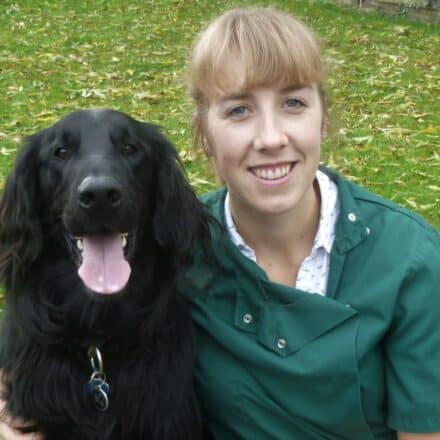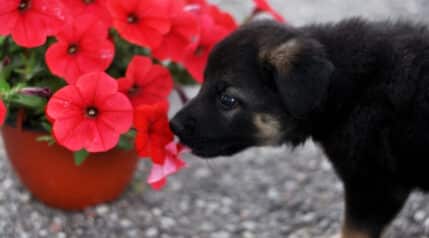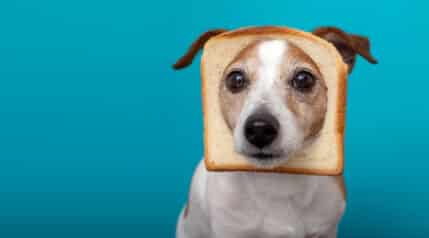Did your dog just eat some coffee grounds right out of the trash can while you weren’t looking? Nothing beats a hot cup of coffee, especially if it is freshly made with ground coffee beans. Used grounds usually end up in the garbage or can be composted as fertilizer in the garden. But what if your pup gets to them first? Many owners are unsure what to do if their dog ate coffee grounds, which can be very scary.
Dogs are scavengers by nature and will try and eat all sorts of things! It’s not uncommon for dogs to eat different foreign objects due to their smell, taste, shape, or texture. In some cases, it can be harmful or fatal. Unfortunately, coffee grounds can be harmful to most dogs because of caffeine, just like tea.
If your dog just ate coffee grounds, your first call should be to your vet. But if you have additional questions, this article explores why they can be dangerous and what you can expect once you contact your veterinarian.
Are Coffee Grounds Dangerous To Dogs?

Yes, coffee grounds have the potential to be toxic to dogs because they contain high levels of caffeine. Caffeine (a type of chemical known as methylxanthine) is a stimulant. In mild doses, it can have properties such as making us more alert and giving us a bit of an energy boost.
But in very high doses, it can have all sorts of adverse effects. Animals are also much more susceptible to the effects of caffeine than humans, so it can be harmful to them to eat highly caffeinated products.
Coffee Ground Consumption: Next Steps
If Fido just wolfed down some coffee grounds while you weren’t looking, you’ll need to take a series of steps. Contacting your veterinarian is obviously one of them, but your vet may need details before you do. Follow the below steps if you find yourself in this unfortunate situation.
Step #1: Remove The Substance And Secure Your Pup
You’ll want to make sure that you remove all coffee grounds from the area. You’ll also need to make sure your pup is secure, perhaps in a bedroom or a laundry room. Somewhere that there’s no easy access to anything they shouldn’t consume.
Step #2: Examine Your Dog
Look your pup over, and ensure they aren’t showing signs of distress. Are there any signs of ill health? Are they trembling or collapsed? Any vomiting or diarrhea? All of these problems require quick veterinary assistance.
Step #3: Find The Evidence
Do you know if what they have eaten is caffeinated, or could it be decaf grounds? Could they have eaten anything else that might make them sick? If they raided the trash can, they could have consumed other items as well as leftover coffee.
Step #4: Contact Your Veterinarian For Advice
Call your local veterinarian and let them know what has happened. It would be useful to tell them your dog’s approximate size or weight. You’ll also want to know the amount they have consumed.
Step #5: Follow Your Veterinarian’s Advice
Depending on the volume consumed, your dog may need to be examined. If your vet wants to see your pup and examine him, then make sure you bring him to the clinic as soon as possible, even if he seems ok at the moment. Symptoms can develop over time, so get him seen sooner rather than later.
Step #6: Prevent Future Accidents
Think about how you might prevent accidents from happening in the future by disposing of the grounds more carefully or by using secure garbage cans. While you might think this is obvious advice, you’d be surprised how many dog owners end up being repeat offenders.
What Should I Expect Next?

If your dog eats a reasonable amount of coffee grounds, you may see some of the following side effects, which usually start within an hour or two after consumption:
- Hyperexcitability (being more active and alert than normal)
- Vomiting and/or diarrhea
- Tachycardia (an elevated heart rate)
- Arrhythmia (an abnormal heart rhythm, skipping or missing heartbeats, for example)
- Tremoring
- Seizures
- Collapse
- Death
These symptoms are caused by the high levels of caffeine found in coffee grounds. These same signs of toxicity can be seen if a dog eats any product that contains caffeine. Some of these include whole coffee beans, instant coffee, loose tea or tea bags, energy drinks, caffeinated soda, and some types of diet pills.
What Will The Veterinarian Do?
If your veterinarian has concerns about your pet, they will ask you to bring them down to the clinic for an examination and treatment. They will check your pup over, looking at things like how they are behaving and listening to their heart for any abnormalities.
Treatment is aimed at trying to prevent further absorption of caffeine. Most vets will usually recommend medication to make your dog vomit to bring up the contents in their stomach. Similar to treatment for chocolate toxicity, activated charcoal may be given to help absorb any remaining traces of caffeine. This treatment regime is usually effective if your dog has been brought in promptly. Many dogs will be able to go home after following this step.
However, if your dog consumed the substance more than a couple of hours ago or showed symptoms of toxicity, they may need further examination and treatment.
What Happens If My Dog Is Sick?

Your dog may be hospitalized for intravenous fluids and monitoring. Fluids given via a drip in this way will help keep blood pressure stable, help them maintain their hydration, and help speed the caffeine’s metabolism by ‘flushing things through.’
Caffeine can be reabsorbed through the bladder wall, so encouraging your pet to urinate frequently will help them get rid of it quicker. Alternatively, a urinary catheter can be passed to help keep any urine draining out. Blood samples may be recommended to analyze any underlying liver and kidney function issues. Then, your veterinarian will be able to advise you further based on those test results.
If your pup is showing any worrying cardiac symptoms, then an electrocardiogram (ECG) might be advised to get some traces of their heart rhythm. The vet will interpret these charts to see what type of arrhythmia is occurring and what medications may be needed to help counteract these.
If your pet is having seizures, then drugs may need to be given to help stop this. Sedatives are also sometimes needed to calm your dog down if they are restless or hyperexcitable. If your dog is very ill then they may need to stay in the hospital for a couple of days for treatment and monitoring.
Will My Dog Be Okay?
Unlike when dogs eat macadamia nuts or other toxic foods, mild cases of caffeine toxicity do very well, and most dogs will have no lasting effects. Dogs that have eaten very small amounts will usually only show minor side effects, such as a bit of agitation and restlessness.
Dogs that consume greater quantities and show more severe symptoms, such as seizures and cardiac arrhythmias, carry a much poorer prognosis. If these dogs aren’t treated promptly, then they could die.
How severely a dog is affected depends on how much they’ve eaten and their size. Larger dogs can handle a greater quantity of caffeine than smaller ones. Dogs with underlying health issues will also be at greater risk of illness. To give your pup the best outcome possible, you must immediately call your veterinarian and seek prompt advice.
If your dog eats decaffeinated coffee grounds, then the risk of them becoming unwell is very low. They may show mild symptoms of tummy upset such as vomiting or diarrhea, but as there is no caffeine present, they shouldn’t require any specific treatment.
Frequently Asked Questions
Can coffee grounds kill a dog?
Potentially, yes. If large amounts are consumed and eaten, and treatment isn’t sought promptly, then dogs can develop serious side effects that could lead to death. The prognosis is worse if the dog is small in size or has any underlying health conditions, as these factors will affect their ability to tolerate a large amount of caffeine.
Should I make a dog vomit if they eat coffee grounds?
You should never induce vomiting at home unless recommended to do so by a vet. Inducing vomiting carries risks, including aspiration pneumonia. In addition, the recipes for making dogs vomit found online are often dangerous and may even cause more harm than coffee.
Your vet will advise if they think your dog needs to be made to vomit. Except in exceptional circumstances, your vet will advise you to come to the surgery if your dog needs to vomit, as their drugs are safer and they can better manage your dog’s risk of side effects.
How much caffeine is left in used coffee grounds?
The exact amount of caffeine depends on the type of coffee bean used. Robusta beans contain a higher amount of caffeine than arabica. Although some of the caffeine ends up in the hot drink, the coffee grounds will still contain a large caffeine concentration.
You may be able to do a rough estimate of caffeine content by looking at the product’s packaging, but the amount in the leftover grounds will be a bit lower than this after being used/brewed.
How much coffee grounds are toxic to dogs?
Potentially fatal doses of caffeine start at 140-150mg/kg body weight (other symptoms will start at lower amounts than this). But it is hard to determine exactly how much caffeine is present in the leftover grounds because different brands and types vary in caffeine content.
It is often hard to estimate how much your dog may have consumed, so it is safest to call your veterinarian for advice rather than trying to work out the exact caffeine contents and volumes.
How long does caffeine stay in a dog’s system?
Caffeine can linger in a dog’s system for an average of 24 – 48 hours, depending on the quantity that has been consumed. The exact amount of time caffeine remains in the system can depend on how much your dog ate, their size, and underlying health status.
Caffeine eliminates from the body faster with intravenous fluids and frequent urination. This helps prevent the reabsorption of caffeine across the bladder wall.
Final Thoughts
It’s important to seek help from a veterinarian if your dog eats coffee grounds. You’ll want to call your vet immediately if you find yourself in this situation. Caffeine in high doses can have many toxic side effects. The sooner you seek advice, the better the outcome will be.
To prevent accidents from happening in the future, make sure any coffee grounds are well out of reach of your canine companion. Consider investing in secure garbage or compost bins to stop them from getting into your household waste. Most dogs do very well with appropriate veterinary care and will make an excellent recovery.






what the heck, I was trying to keep dogs away from a certain area and people suggest on the internet they hate the smell of coffee grounds, now you telling me they eat it.